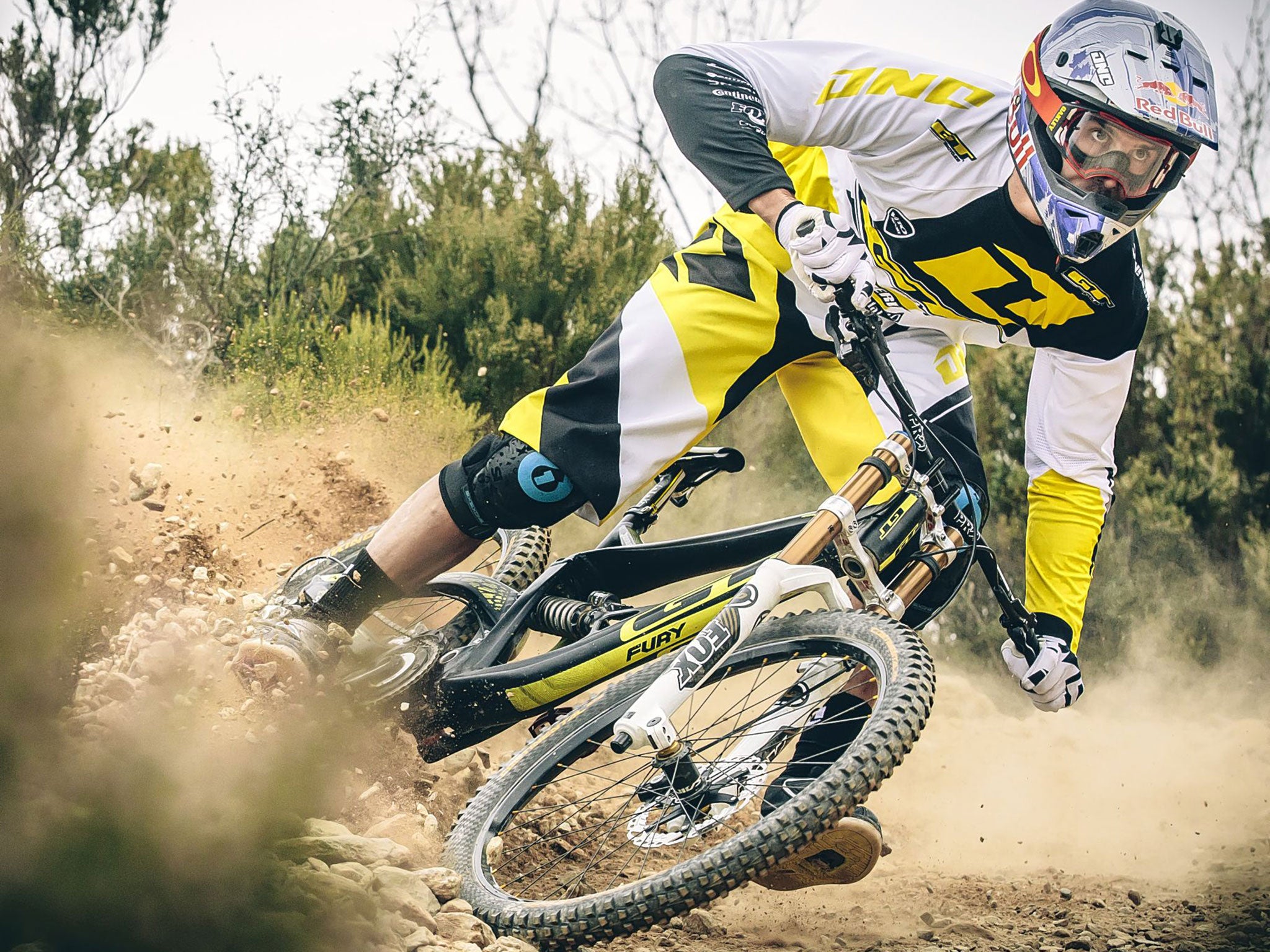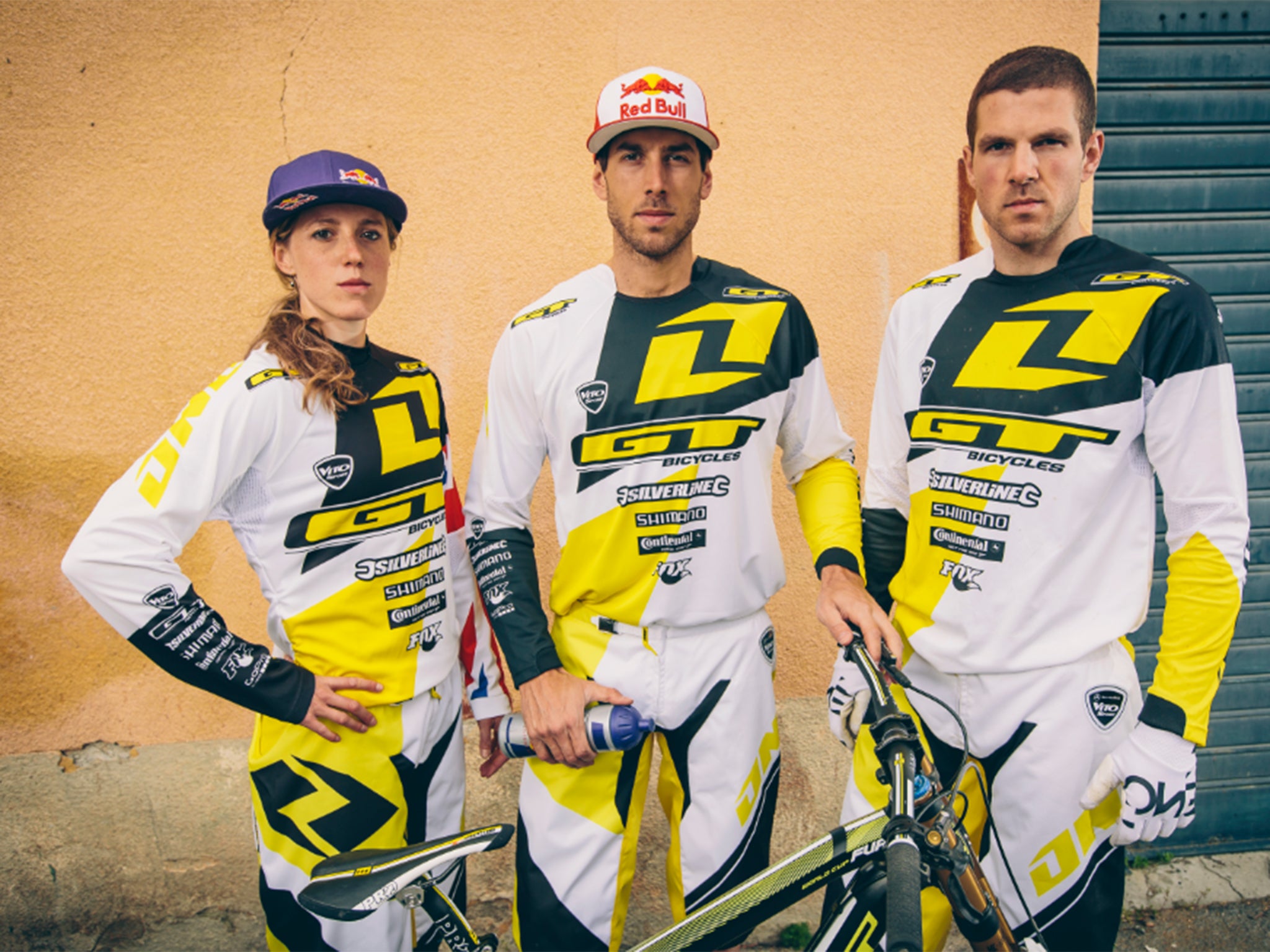UCI Mountain Bike World Cup 2014: Downhill all the way to the top for the Atherton siblings
The Atherton siblings embody the glamour and the risks of their extreme branch of mountain biking. As the World Cup nears its climax Tim Rich talks to a family united in rivalry

Your support helps us to tell the story
From reproductive rights to climate change to Big Tech, The Independent is on the ground when the story is developing. Whether it's investigating the financials of Elon Musk's pro-Trump PAC or producing our latest documentary, 'The A Word', which shines a light on the American women fighting for reproductive rights, we know how important it is to parse out the facts from the messaging.
At such a critical moment in US history, we need reporters on the ground. Your donation allows us to keep sending journalists to speak to both sides of the story.
The Independent is trusted by Americans across the entire political spectrum. And unlike many other quality news outlets, we choose not to lock Americans out of our reporting and analysis with paywalls. We believe quality journalism should be available to everyone, paid for by those who can afford it.
Your support makes all the difference.You fear for Rachel Atherton. She is young, attractive, articulate and a world champion. Her sport is downhill mountain biking, one of the most relentless and physically dangerous activities on the planet.
It has everything a sport needs to become global. Far more so than the Tour de France, it is instantly understandable: whoever is quickest down the mountain wins. It has glamour: the circuit shifts from Australia to the Alps via South Africa. And rather more importantly and, perhaps rather more unsettlingly, it carries a considerable element of danger.
You can watch the World Championship on Red Bull’s YouTube channel but soon television will get hold of it and insist that the courses become ever tougher and the risks ever greater. “Hopefully,” she says with a smile. Her brother, Gee, himself a one-time world champion, interrupts: “The more jumps you put in, the more exciting it will become and the more people will watch it. And you do want people to watch it.”
Even by the standards of extreme sports, the Athertons are an unusual family. The three of them live together in the wilds above Llanrhaeadr, a village in north Wales. Hugh Grant stayed here when filming The Englishman Who Went Up a Hill and Came Down a Mountain. Grant did not come down quite as quickly as Rachel, Gee and Dan Atherton though.
Dan is the driving force behind Atherton Racing. He is the oldest, the one who designs the training courses in the Berwyn Mountains, the one who now does enduro, which is best described as a series of downhills separated by some long climbs uphill. Before the season began, his leg was in plaster and he was on crutches.

It took Dan almost four months to get back on a bike competitively and, when he did in mid-July, conditions in the Italian Alps were wet and dangerous enough to make further participation foolhardy.
He says he had gone out for “a quiet ride in the evening” when he fractured his tibia, although Dan’s reaction to breaking his leg demonstrates the kind of attitude the Athertons have to injury.
“I managed to put the bike away, lock up and got in the van,” he says. “I sent Gee a text saying I was driving myself to hospital and asking whether he could check up on me if I passed out. It takes about 45 minutes to the nearest hospital but this was longer because I was driving with a broken leg.
“You always want bone injuries, not ligaments,” he says matter-of-factly. “Bone grows back together, ligaments sometimes don’t.”
It is time for Rachel’s injury story, which involves a lot of blood and a truck. “We were training in California,” she recalls. “It was that classic when we tried to avoid each other. I went one way, he went the same way and I went up on the windscreen and down to the floor. My shoulder was dislocated but, fortunately, the boys are quite good at relocating a shoulder.”
Danger is something that bonds sportsmen together. It was illustrated in Rush, the film about the 1976 Formula One championship, where in the drivers’ room Niki Lauda would stare at the wall, his eyelids burnt away, while James Hunt chain-smoked and Clay Regazzoni paced around like a caged bear. Nobody knew who was coming back.
Downhill mountain biking is not Formula One but it is fast. Gee did a downhill run on his bike following a ski course in Norway and triggered a speed trap that recorded him travelling at 125kph (77mph).
“Scared is not the right word,” says Dan, who jokes that between them the Athertons have broken every bone in the human body. “Because, if you do what we do, you can’t allow yourself to be scared – but you are very aware of what could go wrong.
“After one race, dad phoned us up and said he had never experienced such highs and lows in the same week. Rachel had won the World Championship and I had been badly injured.”
It is rare for a serious injury to occur in competition because, as Dan points out, equipment and concentration are at a peak. His sister adds: “Sometimes, when your mind slips in the moment you are vulnerable. You catch a snippet of commentary or something in the crowd and then you are down instantly.”
There have been plenty of trophies to ease the pain. In 2008, Gee and Rachel became world champions on the same day. “We were young then so it was pretty special,” says Rachel, who is actually 26 but carries the air of a veteran. In South Africa last year she won the title back in Kevin Pietersen’s home city of Pietermaritzburg.
“The feeling when I became world champion was twofold, absolute exhaustion and pain because it was such a physical course,” he says. “I didn’t know whether I should go out and party because there were other races to come.” You surely did not stay in your hotel room after becoming a world champion? “I did go out and I’m so glad I did.”
In April, Rachel returned to the Eastern Cape to begin the World Cup, a series decided over seven stages scattered across the globe. She was ill, missed the first day of practice, and says she felt she “had hedgehogs in my body” when she competed, although she still finished second.
Though she recovered to win the second round of the World Cup in Cairns, in Australia’s tropical north, that virus took its toll, as did a puncture that wrecked her participation in round three at Fort William.
With three rounds left, Rachel and Gee are fourth and, though they remain in striking distance of the summit, their fate will be decided in North America in the first two weeks of August; first in Quebec, then at Windham in New York State.
The logistics and costs of Atherton Racing, built up from scratch by three siblings – the oldest of whom is 32 – are enormous. “There were a lot of sacrifices in the early days,” says Gee. “When there was money coming in, we never spent it. We could have bought cars and stuff. We didn’t spend anything that wasn’t linked to the racing team.
“People are always surprised we weren’t born into it. Dad was a headmaster of a school in Devon and we have built this up from nothing with its office, its gym, the mechanics and the support team.”
Dan adds: “I can clearly remember the conversation each of us had with our parents. I had finished high school and Dad sat me down and told me he would really like me to try for college. I went for a week and that was it. I went straight into full-time training and never looked back. That paved the way. There was no hope for the other two. It’s not football but it’s possible to make a very good living doing what we do.”
That the three of them work, compete and live together – Rachel and Gee share a house, Dan has a cottage across the way – creates its own pressures. When you spend time with the Brownlee brothers, you get the impression not so much that the triathletes don’t like each other but that there is plenty of friction, which drives their performances forward.
“The very fact we are athletes creates tensions because an athlete wants to be the best,” says Dan. “Put three athletes in a house in a remote location and you will get tensions. Put three siblings together and you’ll get people pounding on your door when you’ve got a broken leg. They don’t give you any rest, not even for a moment.”
Join our commenting forum
Join thought-provoking conversations, follow other Independent readers and see their replies
Comments